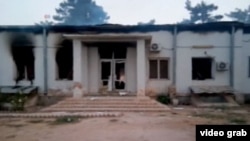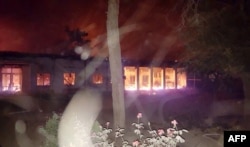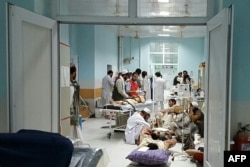The international humanitarian group Doctors Without Borders says an internal review of last month's airstrikes by U.S. forces on its hospital in northern Afghanistan shows no reason why the facility should have come under attack.
The organization, also known as Médecins Sans Frontières (MSF), released a report Thursday documenting events surrounding the airstrikes. The report says there were no armed combatants fighting within or from the hospital grounds.
In response, a U.S. Defense Department spokesman said the top U.S. commander in Afghanistan, Army General John Campbell, has "met personally with MSF representatives."
Spokesman Jeff Davis said the United States is working closely with MSF to identify the dead and wounded, conclude its own investigation and move ahead with condolence payments.
Last month, Campbell said the U.S. accepted full responsibility for the bombing, which, according to the Pentagon, came after Afghan forces called in U.S. airstrikes against Taliban fighters thought to be firing from inside the medical compound.
The MSF document, part of an ongoing review of events undertaken by the group, is based upon 60 debriefings of MSF national and international employees who worked at the 140-bed trauma center; internal and public information; before and after photographs of the hospital; email correspondence; and telephone records.
At least 30 people were killed in the airstrikes, including 13 staff members, 10 patients. Seven bodies have yet to be identified.
“The view from inside the hospital is that this attack was conducted with a purpose to kill and destroy,” said Christopher Stokes, MSF general director. “But we don’t know why. We neither have the view from the cockpit, nor the knowledge of what happened within the U.S. and Afghan military chains of command.”
The initial findings of the MSF review include the details of the provision of the GPS coordinates and the log of phone calls from MSF to military authorities in the attempt to stop the airstrikes. MSF had reached an agreement with all parties to the conflict to respect the neutrality of the hospital, based on international humanitarian law.
“We held up our end of the agreement — the MSF trauma center in Kunduz was fully functioning as a hospital with surgeries ongoing at the time of the U.S. airstrikes,” said Dr. Joanne Liu, international president of MSF. “MSF’s no-weapons policy was respected and hospital staff were in full control of the facility prior to and at the time of the airstrikes.”
Among the 105 patients at the time of the airstrikes, MSF was treating wounded combatants from both sides of the conflict in Kunduz, as well as women and children.
“Some public reports are circulating that the attack on our hospital could be justified because we were treating Taliban,” Stokes said. “Wounded combatants are patients under international law, and must be free from attack and treated without discrimination. Medical staff should never be punished or attacked for providing treatment to wounded combatants.”
The MSF internal review describes patients burning in their beds, medical staff who were decapitated or had lost limbs, and others who were shot from the air while they fled the burning building.
“The attack destroyed our ability to treat patients at a time of their greatest need,” said Liu. “A functioning hospital caring for patients cannot simply lose its protected status and be attacked."







